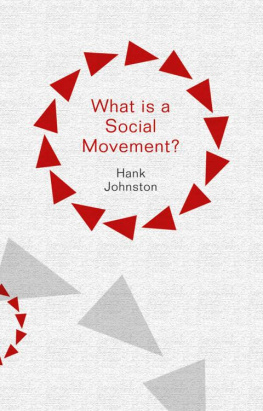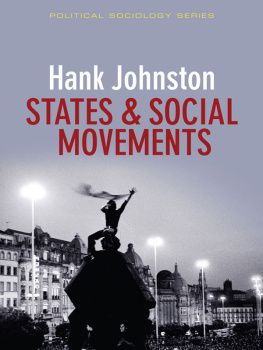Hank Johnston - What is a Social Movement? (What is Sociology?)
Here you can read online Hank Johnston - What is a Social Movement? (What is Sociology?) full text of the book (entire story) in english for free. Download pdf and epub, get meaning, cover and reviews about this ebook. year: 2014, publisher: Polity Press, genre: Politics. Description of the work, (preface) as well as reviews are available. Best literature library LitArk.com created for fans of good reading and offers a wide selection of genres:
Romance novel
Science fiction
Adventure
Detective
Science
History
Home and family
Prose
Art
Politics
Computer
Non-fiction
Religion
Business
Children
Humor
Choose a favorite category and find really read worthwhile books. Enjoy immersion in the world of imagination, feel the emotions of the characters or learn something new for yourself, make an fascinating discovery.
- Book:What is a Social Movement? (What is Sociology?)
- Author:
- Publisher:Polity Press
- Genre:
- Year:2014
- Rating:4 / 5
- Favourites:Add to favourites
- Your mark:
- 80
- 1
- 2
- 3
- 4
- 5
What is a Social Movement? (What is Sociology?): summary, description and annotation
We offer to read an annotation, description, summary or preface (depends on what the author of the book "What is a Social Movement? (What is Sociology?)" wrote himself). If you haven't found the necessary information about the book — write in the comments, we will try to find it.
What is a Social Movement? (What is Sociology?) — read online for free the complete book (whole text) full work
Below is the text of the book, divided by pages. System saving the place of the last page read, allows you to conveniently read the book "What is a Social Movement? (What is Sociology?)" online for free, without having to search again every time where you left off. Put a bookmark, and you can go to the page where you finished reading at any time.
Font size:
Interval:
Bookmark:
Table of Contents
What is Sociology?

Copyright Hank Johnston 2014
The right of Hank Johnston to be identified as Author of this Work has been asserted in accordance with the UK Copyright, Designs and Patents Act 1988.
First published in 2014 by Polity Press
Polity Press
65 Bridge Street
Cambridge CB2 1UR, UK
Polity Press
350 Main Street
Malden, MA 02148, USA
All rights reserved. Except for the quotation of short passages for the purpose of criticism and review, no part of this publication may be reproduced, stored in a retrieval system, or transmitted, in any form or by any means, electronic, mechanical, photocopying, recording or otherwise, without the prior permission of the publisher.
ISBN-13: 978-0-7456-6084-4
ISBN-13: 978-0-7456-6085-1(pb)
ISBN-13: 978-0-7456-8234-1 (epub)
ISBN-13: 978-0-7456-8233-4 (mobi)
A catalog record for this book is available from the British Library.
The publisher has used its best endeavors to ensure that the URLs for external websites referred to in this book are correct and active at the time of going to press. However, the publisher has no responsibility for the websites and can make no guarantee that a site will remain live or that the content is or will remain appropriate.
Every effort has been made to trace all copyright holders, but if any have been inadvertently overlooked the publisher will be pleased to include any necessary credits in any subsequent reprint or edition.
For further information on Polity, visit our website: www.politybooks.com
What is a Social Movement?
Social movements are key forces of social change in the modern world. Although not all social change emanates from them technological innovation, climate change, natural disasters, and wars also are causes social movements are unique because they are guided purposively and strategically by the people who join them. Another key characteristic is that they mobilize and do their business mostly outside established political and institutional channels. This makes questions of their origin and growth especially compelling for the social scientist. Some social movements represent efforts by citizens to collectively create a more just and equitable world. Other movements are motivated by compelling grievances that push their adherents out of their ordinary daily routines. Social movements are typically resisted by forces that favor the status quo, which imparts a fundamental contentiousness to movement actions. But the defining characteristic of all movements, big and small, is that they move history along, sometimes in significant ways. Knowing what they are and how social scientists study them are important tasks if we are to understand contemporary society and where it is headed.
In 2011, Time magazine selected the protester as its person of the year. This was partly because movements in opposition to repressive regimes exploded that year in North Africa and the Middle East. In both Egypt and Tunisia, the Mubarak and the Ben-Ali regimes were brought down by unexpected mass movements of political opposition. In Syria, a similar opposition movement took a different course. It spiraled into a civil war with casualties over 100,000 and a flow of refugees approaching 1.5 million. Many social movements voice wide-ranging demands for political change in these cases, demands for the overthrow of the old regime and the ushering in of a new, more democratic system.
Also that year, another wave of protests occurred in several Western countries in the form of the Occupy movement in the US, the 15-M (for May 15) movement in Spain, and large anti-austerity protests in the UK, Ireland, and Greece. These protests shared common themes that grew out of the global economic collapse, the complicity of political elites, and their failures regarding economic policy. These movements were less successful in achieving their immediate goals, but they did create networks of activists, linked by the new social media, which serve as the basis for continued social-change activism. They also elaborated new tactics of site occupations of central squares and plazas and radical participatory democracy that will have strategic effects in other future movements.
In addition, a huge but less bounded cultural shift is occurring in North America and Europe, again precipitated by a social movement. I have in mind the gay rights movement, a network of organizations and groups that are less in the headlines than the above two examples, but which have worked for decades to fight discrimination, promote equality, and change attitudes about homosexuality and marriage. In the US just twenty years earlier, the Defense of Marriage Act, which banned gay marriage at the federal level, was passed by the Clinton administration with little congressional opposition. Today, a majority of US citizens are not opposed to gay marriage. Ex-President Clinton (and his wife perhaps a future president) both publicly affirm that the Defense of Marriage Act was a mistake. While gay marriage still remains a contentious issue, it is fair to say that this shift in public opinion would not have occurred without the various campaigns of the gay rights movement.
These are different kinds of movements. Those that occurred as part of the Arab Spring were obviously political, and protesters risked a great deal taking action against repressive states. In democratic polities such as Spain and the United States, social movements are quite common, and at any given time the analyst finds numerous movements mobilizing on a wide variety of issues and claims. They are an important part of the political landscape whereby diverse groups and organizations promote their interests, make demands, and articulate their visions of change. The gay rights movement has political dimensions as it fights for marriage equality, which means that it must fight against legislation such as the Defense of Marriage Act and against the anti-gay marriage Proposition 8 in my home state of California. But it also has a cultural dimension in changing ideas about marriage, sexuality, and gendered performances that may be less apparent but no less important in the scope of social change. Numerous groups and organizations in the GLBT (for gay, lesbian, bisexual, and transgender) movement have contributed to this effort over the years in different ways.
It is a large undertaking to navigate the complexity of these political, cultural, and organizational elements in a research project, and the analyst must make decisions about where to begin, which groups to include and which not to, what to focus on and what to place aside. Moreover, every social researcher knows how essential it is to define one's terms precisely. A good starting place for this book is to clarify those decisions about how we come to know about a social movement its boundaries regarding which groups, ideas, and actions are included and which ones are not.
I approach the study of social movements guided by Charles Tilly's observation (1978: 89) that the field's basic analytical dimensions are: (1) the groups and organizations that make up a collective action; (2) the events that are part of the action repertoire; and (3) the ideas that unify the groups and guide their protests. He stressed that, when we study social movements, we tend to focus on just one of this trinity, which, in turn, pulls us into related areas of the other two spheres. For example, if we are interested in studying a protest event say, a huge antiwar protest in a large city we are invariably drawn to the groups that organized it and then their ideas, which motivated their actions. Much has changed in the field of social movement research since Tilly offered these ideas, and they can be fine-tuned to better reflect how the field has advanced, while still maintaining the insight that a focus on one draws the analyst to the relevance of the others.
Font size:
Interval:
Bookmark:
Similar books «What is a Social Movement? (What is Sociology?)»
Look at similar books to What is a Social Movement? (What is Sociology?). We have selected literature similar in name and meaning in the hope of providing readers with more options to find new, interesting, not yet read works.
Discussion, reviews of the book What is a Social Movement? (What is Sociology?) and just readers' own opinions. Leave your comments, write what you think about the work, its meaning or the main characters. Specify what exactly you liked and what you didn't like, and why you think so.








